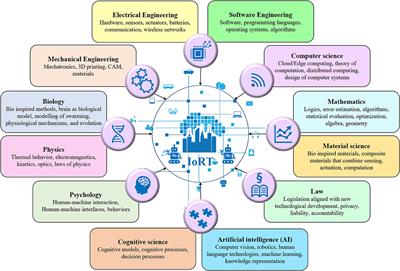Introduction
The fifth generation of wireless technology, known as 5G, has been a topic of discussion and anticipation for several years. It promises lightning-fast speeds, ultra-low latency, and massive connectivity, but what truly makes 5G revolutionary is its potential to transform the Internet of Things (IoT) landscape. In this article, we’ll delve into the pivotal role that 5G plays in advancing IoT technologies, ushering in an era of unparalleled connectivity, innovation, and transformative possibilities.
The fifth generation of wireless technology, known as 5G, has indeed been a hot topic of anticipation and discussion for several years, and it’s not just about faster download speeds and reduced latency. 5G is set to be revolutionary in the way it transforms the landscape of the Internet of Things (IoT), unlocking a realm of possibilities that were previously constrained by connectivity limitations.
Massive Connectivity: One of the key strengths of 5G lies in its ability to connect a massive number of devices simultaneously. This is especially critical for IoT, where the number of interconnected devices is projected to grow exponentially. With 5G, we’re not talking about thousands but millions of devices seamlessly communicating with each other, enabling the full potential of IoT ecosystems.
Ultra-Low Latency: In IoT applications where split-second decision-making is crucial, such as autonomous vehicles and remote robotic surgeries, ultra-low latency provided by 5G is a game-changer. It enables real-time interactions and responses, making applications safer and more reliable.
Enhanced Reliability: 5G networks are designed with reliability in mind. For mission-critical IoT applications like industrial automation and infrastructure monitoring, this means a network that can be trusted to deliver data and commands consistently and without interruption.
Bandwidth for High-Quality Data: IoT applications often involve transmitting large amounts of data, whether it’s high-definition video from security cameras or complex sensor data from smart factories. 5G’s high bandwidth ensures that this data can be transferred smoothly, enabling richer and more detailed insights.
Energy Efficiency: While IoT devices are typically low-power, the efficiency of 5G networks can further extend the battery life of these devices. This is particularly important for applications like environmental monitoring and agriculture, where devices need to operate for extended periods without frequent battery replacement.
Smart Cities and Infrastructure: 5G is a cornerstone of building smart cities and modern infrastructure. From traffic management to public safety and waste management, 5G-powered IoT solutions will enhance urban living in ways we can’t yet fully grasp.
Healthcare Revolution: Remote patient monitoring and telemedicine are poised for a significant leap forward with 5G. Patients can receive high-quality care from the comfort of their homes, and medical professionals can access real-time patient data with confidence.
Agricultural Precision: In agriculture, 5G-driven IoT devices can provide farmers with precise data on soil conditions, weather, and crop health. This information empowers them to make data-driven decisions that optimize yields and resource usage.
In conclusion, 5G is more than just an upgrade to our wireless networks; it’s a catalyst for a new era of IoT innovation and possibilities. It will reshape industries, improve our daily lives, and drive economic growth. As we continue to unlock the full potential of 5G and IoT working in harmony, we’re on the cusp of a transformative technological revolution that will touch virtually every aspect of our connected world.
Explore this link for a more extensive examination of the topic: 5G-Advanced explained | Nokia
Understanding the Internet of Things (IoT)
Before we explore the impact of 5G, it’s essential to grasp the concept of the IoT. The IoT refers to a vast network of interconnected devices, sensors, and objects that can collect, exchange, and process data autonomously. These devices can range from everyday household items like refrigerators and thermostats to industrial machinery and smart city infrastructure. What unites them is their ability to communicate and share information with other devices over the internet.
The IoT’s significance lies in its transformative potential. It not only connects devices but also empowers them with the ability to make decisions, optimize processes, and improve our lives. This interconnectedness extends beyond convenience; it has far-reaching implications for efficiency, sustainability, and innovation across various industries. Whether it’s enhancing healthcare through remote patient monitoring or revolutionizing agriculture with precision farming, the IoT is reshaping how we interact with the world around us. Understanding its capabilities is crucial as we delve into the game-changing influence of 5G technology on this vast network of possibilities.
Don’t stop here; you can continue your exploration by following this link for more details: Understanding the adoption of Industry 4.0 technologies in …

The 5G Difference
The key differentiator of 5G technology is speed. While 4G networks can provide respectable download and upload speeds, 5G takes connectivity to a whole new level. With 5G, we’re talking about download speeds that can reach up to 20 gigabits per second—more than 10 times faster than the best 4G networks. This immense bandwidth and speed open the door to a multitude of IoT possibilities.
Massive Connectivity: 5G’s low-latency and high-capacity network can support an unprecedented number of IoT devices. This means that in a 5G-powered world, we can have an even greater number of interconnected devices working seamlessly together.
Real-Time Data Processing: The ultra-low latency of 5G enables real-time data processing and analysis. For applications like autonomous vehicles and telemedicine, where split-second decisions are crucial, 5G ensures that data travels virtually instantaneously.
Enhanced Security: With more IoT devices comes an increased need for security. 5G networks provide enhanced security features, protecting IoT devices and the data they transmit from cyber threats.
Energy Efficiency: 5G technology is more energy-efficient than previous generations. This is vital for IoT devices that may be battery-powered or located in remote areas.
Smart Cities: 5G is a game-changer for the development of smart cities. It enables advanced infrastructure, such as smart traffic management systems, waste disposal optimization, and efficient energy distribution.
For additional details, consider exploring the related content available here Study and Investigation on 5G Technology: A Systematic Review …
The Applications of 5G-Powered IoT
The applications of 5G-powered IoT are vast and diverse, spanning multiple industries:
Healthcare: Telemedicine and remote patient monitoring become more accessible and reliable with 5G, improving healthcare delivery.
Manufacturing: Smart factories utilize 5G to enable real-time monitoring, predictive maintenance, and seamless automation.
Agriculture: Precision agriculture benefits from 5G’s ability to provide real-time data on soil conditions, weather, and crop health.
Transportation: Connected and autonomous vehicles rely on 5G for instant communication and decision-making, enhancing safety and efficiency on the roads.
Entertainment: Virtual and augmented reality experiences become more immersive and accessible with 5G, transforming the entertainment industry.
For a comprehensive look at this subject, we invite you to read more on this dedicated page: A review on 5G technology for smart energy management and smart …

Conclusion
The rollout of 5G technology is not just about faster downloads on our smartphones; it’s about revolutionizing the way our world connects and operates. The IoT, powered by 5G, will touch every aspect of our lives, from how we work and play to how we manage resources and protect the environment. As 5G networks continue to expand, we can anticipate a future where IoT technologies bring unprecedented convenience, efficiency, and innovation into our daily routines.
The rollout of 5G technology represents a profound shift in the way we perceive and interact with the world around us. While faster downloads on our smartphones are undoubtedly a part of the equation, the true magic of 5G lies in its potential to transform our very way of life.
Workplace Transformation: 5G-enabled IoT will revolutionize the workplace. Remote work will become even more seamless, with virtual reality (VR) and augmented reality (AR) enabling immersive collaborations regardless of physical distance. Smart offices will optimize energy usage, lighting, and space allocation, creating more efficient and sustainable work environments.
Healthcare Evolution: Healthcare will undergo a significant transformation as 5G-powered IoT devices enable remote patient monitoring with real-time data streaming. Telemedicine will become a standard, improving access to healthcare for all, while wearable health tech will empower individuals to proactively manage their well-being.
Education Reinvention: The educational landscape will see a renaissance with 5G and IoT. Virtual classrooms, personalized learning experiences, and interactive educational content will become the norm. Students will have access to a world of knowledge at their fingertips, regardless of their physical location.
Smart Cities Redefined: 5G-driven IoT is the foundation of smart cities. Traffic management, waste disposal, public safety, and energy efficiency will all see remarkable improvements. Citizens will enjoy cleaner, safer, and more efficient urban environments.
Environmental Stewardship: IoT devices connected via 5G will play a pivotal role in environmental conservation. From monitoring air and water quality to optimizing energy consumption, these technologies will empower individuals, businesses, and governments to take proactive steps towards a more sustainable future.
Resource Efficiency: Industries such as agriculture, manufacturing, and logistics will benefit from 5G and IoT by optimizing resource usage. Precision agriculture will maximize crop yields while conserving resources, smart factories will enhance productivity, and supply chains will become more efficient and resilient.
Entertainment and Leisure: Entertainment will take on new dimensions with 5G and IoT. Immersive experiences in gaming, sports, and entertainment will blur the lines between physical and virtual worlds. Smart homes will offer personalized, AI-driven entertainment options tailored to individual preferences.
Transportation Revolution: Autonomous vehicles and intelligent transportation systems will become commonplace, transforming the way we move within and between cities. Traffic congestion will be reduced, and road safety will improve dramatically.
As 5G networks continue to expand and mature, we stand on the threshold of a future where IoT technologies powered by 5G bring unprecedented convenience, efficiency, and innovation into every facet of our daily lives. The possibilities are boundless, and the journey promises to be nothing short of transformative.
Should you desire more in-depth information, it’s available for your perusal on this page: Qualcomm Reveals 5G-Advanced Technologies and Experiences …
More links
To expand your knowledge on this subject, make sure to read on at this location: Agriculture’s technology future: How connectivity can yield new …
